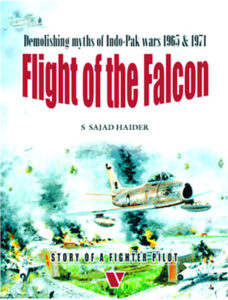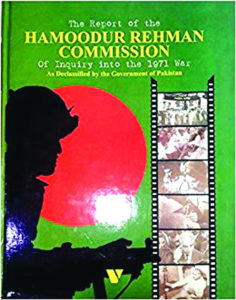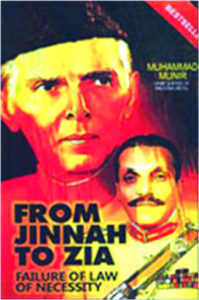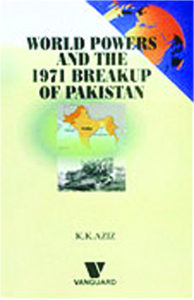

Flight of the Falcon: Demolishing myths of Indo-Pak wars (1965 & 1971)
S Sajad Haider
Vanguard Books (2010)
Flight of the Falcon is about the spectacular episodes, trials and tribulations I had to face during my 28 years in the Pakistan Air Force. There is more in my story as it traverses through Pakistan’s misfortunes soon after the death of Quaid-e-Azam Mohammad Au Jinnah. It begins with my encounter with the father of the nation, his unceremonious death followed by the murder of his legacy of unity. Ayub Khan’s mid-night coup was a violation of the role the Quaid-e-Azam had bequeathed on the armed forces. The domino effect of dictatorial rule by unprofessional generals with unflattering soldiering history and self seeking corrupt politicians has finally brought Pakistan to its knees. No lessons were learnt and history keeps punishing us. What a legacy for our children to inherit, for which the nation continues to pay a price. What will it take to change our course?
Every year, the 1965 war is celebrated remorselessly to keep under wraps the failures of our leadership at the time. I feel cheated and enraged at the loss of the many gallant men who were martyred believing they were fighting for a sacred cause. The 1971 war was a corollary to the 1965 war and the Kargil conflict followed in the same vein. Shallow personal interests were projected as national interests by dictators. All these wars and conflicts proved to be catastrophic for the economy and security of Pakistan. Were these conflicts avoidable? If not, why were they not planned and directed with professional dexterity? Why were no lessons learnt from each disaster? Such questions have hardly been addressed candidly from fear of retribution by the powers that be.
Unfortunately, the armed forces have become punching bags for all the ills of the country. These are deceptive tactics to deflect our top leadership’s failures and corruption. The combat crews from the army, navy and especially the PAF have always fought with indomitable courage and sacrificed lives to save what was and is left of Pakistan. They continue to perform their duty to the nation every minute of the day and night as you and go about our daily lives.Who pushed us into the devastation of wars and what was the outcome is a moot point and will be the focus of my book. It is time that the history of our wars is re-written and the truth is told. The lessons need to be brought out for Pakistan’s survival. I feel it should be my legacy to leave behind a detailed account of not just the battles in which I fought, but the circumstances which led to these senseless conflicts and the leaders responsible for perpetrating them. In the end, the truth shall prevail.
S Sajad Haider is a decorated fighter pilot (recipient of the Gallantry Award of Sitara-e-Jurat, equivalent of the Distinguished Flying Cross) and a veteran of the 1965 and 1971 air wars with India. In the 1965 war he was in command of the No 19 Squadron which blunted the Indian attack across the Wagha border on the 6th of September, saving Lahore. The author also led the destructive lightening strike against Pathankot that same afternoon (depicted on the book cover in a painting by Group Captain SMH Hussaini). In 1971 he was the commander of the PAF’s biggest tactical fighter wing at Sargodha. He attended the Joint Services Staff College at Latimer, England and the National Defence College in Rawalpindi. He holds a Master’s degree in Strategy and International Affairs. In 1979, his career in the Pakistan Air Force came to an abrupt end when he stood up to Zia-ul-Haq for brutalizing dissenting voices and reneging on his promise to hold elections. The author went on to become a successful businessman and currently resides in Islamabad.

The report of the Hamoodur Rahman Commission of Inquiry into the 1971 War - As declassified by the government of Pakistan
Vanguard Books (2001)
The report of the Hamoodur Rehman Commission of Inquiry into the 1971 War (As declassified by the Government of Pakistan) is more than just an investigation into what happened in 1971 in East Pakistan. It is, in fact, the views of three eminent Pakistani judges, Justice Hamoodur Rehman, Chief Justice of the Supreme Court of Pakistan, Justice Anwarul Haq, Chief Justice of the Lahore High Court, and Justice Tufailali Abdur Rahman, Chief Justice of the Sindh High Court, on the history of Pakistan from August 1947, to October 1958, when Pakistan was a floundering democracy, and the subsequent periods of Marital Law under General Ayub Khan and General Yayha Khan.
It gives an analysis of the intentions of General Yahya Khan and his cohorts, which may not be found elsewhere in the official history of Pakistan because the Report had remained secret till recently. The Report studies the international scene on the eve of the Fall of Dhaka and, more importantly, goes into the strategic thinking of the Pakistan army.
It calls in question the theory that the defence of East Pakistan lies in West Pakistan, and reveals that the GHQ had done nothing to underpin its own strategic thinking with preparedness. It examines the events in East Pakistan before the outbreak of disturbances there and minutely analyses the surrender of the Pakistan army in Dhaka. The Hamoodur Rehman Commission Report performs the task of a textbook on the history of Pakistan, based on the evidence placed before the Commission by those it summoned. It reveals more facts of history than any other textbook authorised by the Government of Pakistan.

From Jinnah to Zia
Muhammad Munir
Vanguard Books (2017)
This book “does not claim to be a history of Pakistan-. Its less ambitious format is defined as being “a part of that history namely- the ideological and geographical changes in Pakistan”
The author maintains that the Quaid-i-Azam never used the words “ideology of Pakistan” laying emphasis on Quaid’s speech of August II, 1947, to prove that’. the pattern of government which the Quaid-i-Azam had in mind was a secular, democratic government-. The scene, however, changed with Liaqat Ali Khan’s objective resolution, which the author contrast with the Quaid’s vision of Pakistani Polity, pointing out five points of difference involving question of sovereignty God or people,; the existence and non existence of religious minorities in Pakistan.
Munir points out how the taxation system of the early days of Islam cannot be adopted in TOTO and its original form to cope with the needs of a modern state. The view that everything is possible provided it is not contrary to the Quran and Sunnah alone can save these taxes, because in the Quran and Hadis there is nothing against most of them. But in that case you will have to say good-bye to the claim that Niazam-i-Mustafa or Quran and Sunnah provide solutions of everything under the sun.
The author is a former chief justice of Pakistan.

World powers and the 1971 breakup of Pakistan
K. K. AZIZ
Vanguard Books (2016)
Most people have a vague idea that in the months leading to the 1971 breakup of Pakistan and during the savage military action in East Pakistan all the major world powers (except China, which couldn’t do anything) were severely critical of Pakistan’s policies and decisions. For the first time, this book chronicles and records this hostility precisely, punctiliously and extensively.
For this purpose Professor Aziz has consulted an incredibly enormous range of source material: 152 newspapers and magazines, 155 journal articles, 133 books, and several unpublished radio and TV broadcast transcripts.
The focus is on the United States, the United Kingdom and the USSR, with a brief look at the rest of the world. A detailed chapter de-scribes the making and implications of the lethal Indo-Soviet Treaty. The brief but explosive prologue is a novel and damaging expose of the unpardonable mistakes made by the All India Muslim League leadership between 1906 and 1947 which, irrevocably and inevitably, led to the creation of Bangladesh. This investigation is based on original and contemporary documents. To put the foreign comments in their context, the more relevant portions of the Hamood-ur-Rahman Commission Report are reproduced in an appendix.
This book is a register of events, a narrative of public opinion and an account of how the world powers saw and judged the developments of 1970-71. It is a collection of stark and brutal facts and comments upon them. It is not a work of analysis or judgment because Pakistani scholars are denied the freedom of expression essential for that exercise.
As most of the material used here is available in Pakistan but not all of it at one place anywhere, this volume is a valuable and indispensable source book for any study of the 1971 disaster.
K.K. AZIZ has taught poetics, history, Islam and Asian studies for 50 years at various institutions, including Govt. College Lahore, and the Universities of. Manchester, Punjab, London, Khartoum, Heidelberg, Toronto and Cambridge.
In Pakistan he has served as Deputy official historian to the Federal Govt., Chairman of the National Commission on Cultural Research, and Special Policy Advisor to the Prime Minister.
In 1997, he was elected to the coveted Aziz Ahmad Memorial lectureship at the University of Toronto. Author of 32 scholarly works, he commands an international reputation as a political scientist, historian and general lecturer.

